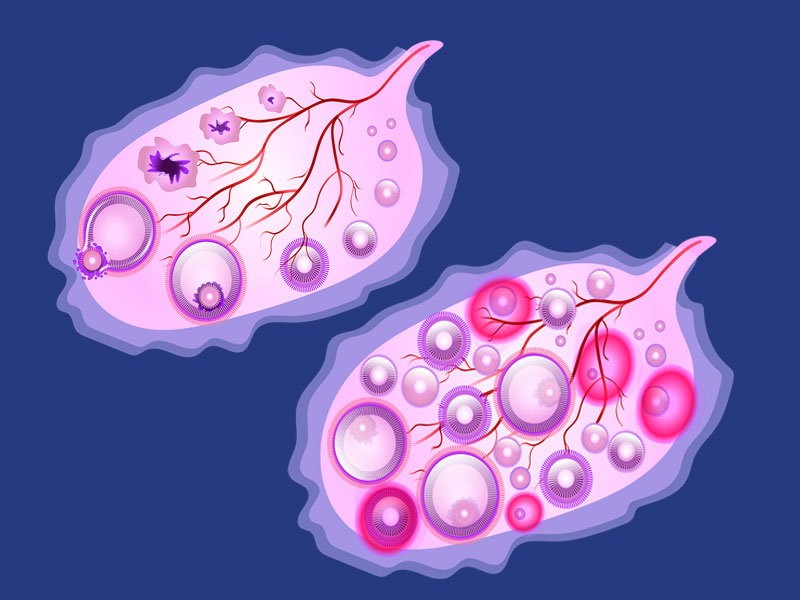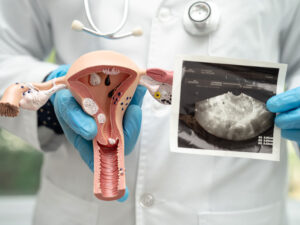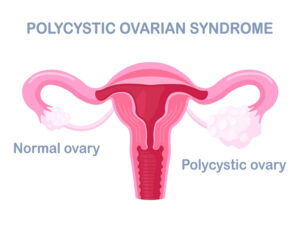
Polycystic Ovary Syndrome (PCOS) is a common endocrine disorder that affects approximately 1 in 10 women of childbearing age. If you’re one of those women with PCOS, you’ve probably heard about the challenges you may face if you ever try to get pregnant.
That’s because PCOS causes hormonal imbalances, irregular menstrual cycle, lack of ovulation, and metabolism problems. These can all have a significant impact on your reproductive health, particularly when it comes to fertility and conception.
But that doesn’t mean you need to give up the dream of getting pregnant and having a healthy baby if that’s what you wish. It’s possible to avoid pregnancy complications with proper management and medical support.
This comprehensive guide offers an in-depth look at PCOS syndrome, its effects on fertility, and the steps you can take to increase your chances of conception and having a healthy PCOS pregnancy.
Let’s start by understanding polycystic ovary syndrome.
Table of Contents
What is Polycystic Ovary Syndrome (PCOS)?
Impact of PCOS on Fertility and Conception
Chances of Getting Pregnant for PCOS Women
Treatment of PCOS for Pregnancy
Best Age to Get Pregnant with PCOS
First Signs of Pregnancy with PCOS
Is PCOS Considered a High-Risk Pregnancy?
What is Polycystic Ovary Syndrome (PCOS)?
Polycystic Ovary Syndrome (PCOS) is a complex hormonal disorder that affects women of reproductive age, causing elevated levels of male hormones (androgens), insulin resistance, and malfunctioning of the ovaries.
Because PCOS affects ovarian function, it’s one of the most common causes of infertility.
It can also lead to various long-term health issues, such as type 2 diabetes, cardiovascular disease, high blood pressure, and endometrial cancer.
PCOS women usually have enlarged ovaries due to numerous small fluid-filled sacs (follicles) that surround the eggs. But these are not necessarily cysts – despite the name of the condition.
This enlargement of the ovaries is the result of hormonal imbalances that disrupt normal development of the follicles. As a result, they often remain immature, preventing the release of the eggs.
PCOS Symptoms
Many women only find out they have polycystic ovary syndrome when they’re trying to get pregnant and struggle with irregular menstrual cycles or PCOS pain.
But PCOS symptoms are not limited to that.
It’s good to understand polycystic ovary syndrome and its wide-ranging effects to help you manage the condition and improve your overall health and quality of life.
So, here are the most common symptoms you should expect if you have polycystic ovary syndrome:
- Irregular menstrual cycles
- Hormone imbalance
- Excess androgen levels
- Hirsutism (excess facial and body hair)
- Skin problems, like severe acne and dark spots
- Male-pattern baldness (hair thinning on the scalp)
- Polycystic ovaries, which may lead to anovulation and infertility
- Weight gain
- Insulin resistance, which can eventually lead to long-term health conditions like type 2 diabetes and cardiovascular disease
- Low self-esteem, anxiety, and depression
PCOS Diagnosis
If you struggle with one or more of the symptoms listed above and you intend to get pregnant, the earlier you talk to your doctor, the better.
Your healthcare providers will do comprehensive exams to rule out any other condition, and if you end up with a diagnosis of polycystic ovary syndrome, they’ll help you manage your symptoms to increase your chances of conceiving.
To diagnose PCOS, your doctor typically uses a combination of medical history, physical examination, and different exams. Key steps in the diagnosis process include:
Medical History and Symptoms
Your doctor will ask about your menstrual cycle, weight changes, and any symptoms such as excess hair growth or acne.
Physical Examination
A physical exam checks for signs of excess hair growth, insulin resistance, and other skin changes.
Pelvic Examination
This may be conducted to check for abnormalities in your reproductive organs.
Blood Tests
Blood tests can measure your hormone levels, including androgens and insulin, to check for hormonal imbalances. In addition, your healthcare provider may request some specific blood tests to exclude other conditions with similar symptoms, such as thyroid disorders or hyperprolactinemia.
Ultrasound
A pelvic ultrasound can show the appearance of the ovaries and the thickness of your uterine lining and the follicles.
PCOS Diagnosed?
Once you have a diagnosis, your healthcare provider will work with you to treat PCOS symptoms and, in case you want to get pregnant, increase your chances of conceiving and having a healthy pregnancy.
Impact of PCOS on Fertility and Conception
Due to irregular menstrual cycles, hormonal imbalances, and anovulation, polycystic ovary syndrome can significantly and adversely affect fertility, your ability to conceive and have healthy PCOS pregnancies.
Here is how PCOS affects pregnancy and the main challenges you may face while trying to conceive:
- Timing of Ovulation: Irregular cycles make it difficult to predict ovulation and determine the best time to try for pregnancy.
- Insulin Resistance: This condition can affect your overall reproductive health and cause gestational diabetes. You may need to take medication to improve insulin sensitivity.
- Weight Management: Many women with polycystic ovarian syndrome struggle with weight gain, which can further affect ovulation and fertility. So, if you’re trying to get pregnant, your healthcare provider may advise healthy eating and losing weight to improve your chances.
- Increased Risk of Miscarriage: Hormonal imbalances and insulin resistance can increase the risk of pregnancy complications and early pregnancy loss.
But worry not. Despite these challenges, many women with PCOS can and do become pregnant with appropriate treatment and management.
What Are the Chances of Getting Pregnant for PCOS Women?
The success rates for pregnancy with PCOS vary depending on several factors, including:
- Treatment: Fertility treatment, such as ovulation induction medications – like clomiphene – and assisted reproductive technologies (ART) like in vitro fertilization (IVF), can significantly improve your chances of conception.
- Lifestyle Changes: Losing weight, healthy eating, and regular exercise can improve ovulation and increase the likelihood of pregnancy.
- Medical Management: Medications to manage insulin resistance and hormonal imbalances, like metformin, can also enhance fertility.
Treatment of PCOS for Pregnancy
Some medicines are proven effective in increasing the chances of conceiving in PCOS women, and success rates for pregnancy in women with PCOS who undergo fertility treatment are generally good.
For example, studies have shown that ovulation induction with medications like clomiphene citrate can result in ovulation in up to 80% of women with PCOS, with pregnancy rates of 30-40% over several cycles.
In addition, metformin is also commonly used for PCOS treatment. Originally used to treat type 2 diabetes, this medication has become a valuable tool in managing polycystic ovary syndrome.
While it’s not a cure for PCOS, metformin can significantly improve your quality of life and reproductive outcomes. Here’s how:
What Does Metformin Do for Polycystic Ovaries?
- Improves Insulin Sensitivity
Metformin increases the sensitivity of cells to insulin, helping to lower blood insulin levels and reduce overall insulin resistance and the risks of having gestational diabetes.
- Regulates Menstrual Cycles
By improving insulin sensitivity and reducing insulin levels, metformin helps balance hormones. Elevated insulin levels can cause the ovaries to produce more androgens, which disrupt the menstrual cycle.
With reduced androgen levels, you’ll experience more regular periods, which is crucial for ovulation and fertility.
- Promotes Ovulation
Insulin resistance and high insulin levels interfere with the normal ovulation process. Metformin’s effect on reducing insulin levels can help restore regular ovulation.
Overall, when used in combination with ovulation-inducing medications, such as clomiphene citrate, metformin improves the chances of ovulation and conception if you have PCOS.
Surgical Options
While lifestyle changes and medical treatments are typically the first lines of defense to treat PCOS, some surgical options are also available if you do not respond well to these approaches, particularly when fertility is a primary concern.
Procedures like ovarian drilling and ovarian cystectomy can help induce ovulation and improve fertility.
However, these surgeries come with risks and are not typically first-line treatments. It’s crucial to discuss all available options with your healthcare provider to determine the best course of action based on your circumstances and health status.
Here are the main surgical options available for treating PCOS:
- Ovarian Drilling
- Laparoscopic Ovarian Wedge Resection
- Ovarian Cystectomy
The Best Age to Get Pregnant with PCOS
The best age to get pregnant with PCOS is similar to the general population, as fertility naturally declines with age. However, if you have any of the main four types of PCOS, you should consider the following:
Earlier is Better: Fertility is generally higher in women under 35. The sooner you address your fertility issues, the better your chances of a successful pregnancy.
Individual Health: Managing PCOS symptoms and overall health can improve fertility at any age. It’s essential to work with your healthcare provider to treat PCOS, optimize your health, and manage any PCOS symptoms before attempting to conceive.
But, as mentioned, while PCOS can present challenges to fertility and pregnancy, you can still conceive and have a healthy pregnancy with appropriate medical support and lifestyle changes. Early diagnosis and proactive management are vital in improving your reproductive outcomes.
So – with your PCOS treated, now let’s take a look at what you should consider after getting pregnant.
First Signs of Pregnancy with PCOS
So, you missed a period, but how do you know if it’s a common PCOS symptom or if you’re pregnant?
Women with polycystic ovary syndrome can experience the same early pregnancy symptoms as any pregnant women, including:
- Missed period
- Fatigue
- Nausea and vomiting
- Breast changes
- Frequent urination
- Food cravings or aversions
If you’ve been having any of these pregnancy symptoms, it might be a good idea to check if you’re pregnant!
When to Take a Pregnancy Test
You should consider taking a pregnancy test if you notice one or more of the following:
- Missed Period: Despite irregular cycles, if your period is significantly delayed (e.g., more than 35 days since the last period), you may be pregnant.
- Symptoms of Pregnancy: Pregnant women symptoms, such as nausea and vomiting are not typically PCOS symptoms, so a pregnancy test may be useful if you’re experiencing any of those.
- Fertility Treatments: If you’re undergoing treatments like ovulation induction, you should also take a pregnancy test if menstruation does not occur as expected.
Is PCOS Considered a High-Risk Pregnancy?
Now that you finally got pregnant, what next? How to manage a pregnancy with PCOS? How healthy are pregnant polycystic ovaries? Are you at a higher risk for complications? Let’s find out.
Unfortunately, yes. PCOS is often considered a high-risk condition for pregnancy due to the associated complications that can arise for both you and your baby.
Women with PCOS are at a higher risk of certain pregnancy-related complications, such as gestational diabetes, which require careful monitoring and management throughout the pregnancy.
Criteria for High-Risk Pregnancy with PCOS
The criteria for a high-risk pregnancy in women with PCOS can include:
- History of infertility, recurrent miscarriages, or gestational diabetes
- Obesity
- Insulin resistance or type 2 diabetes
- Elevated androgen levels
- High blood pressure
If you fit in any of these criteria, it’s essential to have regular prenatal care for managing a high-risk pregnancy associated with PCOS. Regular check-ups help in the early identification and management of potential complications and reduce the risk of adverse outcomes.
Regular visits also allow your healthcare providers to develop and adjust a personalized care plan based on your specific needs and risk factors.
And the bottom line you want to know is this…
Is it Possible to Have a Healthy Pregnancy with PCOS?
Yes, many women with polycystic ovary syndrome (sometimes called polycystic ovarian syndrome) can have healthy pregnancies.
PCOS can present additional challenges and pregnancy complications. But with appropriate medical care, lifestyle modifications, healthy eating, and diligent management of symptoms, you can still have a healthy pregnancy and delivery.
Regular communication with your healthcare providers is essential to address any concerns you have about polycystic ovary syndrome and pregnancy, and ensure the best outcomes for both you and your baby.
Receive Outstanding PCOS Management and Prenatal Care at Stella Mattina
Navigating pregnancy with PCOS can present unique challenges, but with the right support and care, you can have a healthy and successful pregnancy journey.
At Stella Mattina, we specialize in providing exceptional prenatal care tailored specifically for every woman – which includes women with PCOS. Our experienced and compassionate team of obstetric specialists is dedicated to supporting your health and well-being every step of the way.
To assist with this, we offer same-day appointments if you need one, and also have doctors in the team who speak Spanish. Don’t let anything put you off getting help with polycystic ovary syndrome so you can improve your chances of conception!
Schedule your appointment with Stella Mattina today.
Dr. Krum is currently in practice in Arlington, TX. He received his undergraduate degree at Texas A&M University, then attended UTMB Galveston for medical school, finishing in 1986, completing his residency there in 1990. Providing a full range of obstetrical and gynecological care, he specializes in the treatment of endometriosis and robotic surgery. He arranges his schedule so that same-day appointments are usually available.






